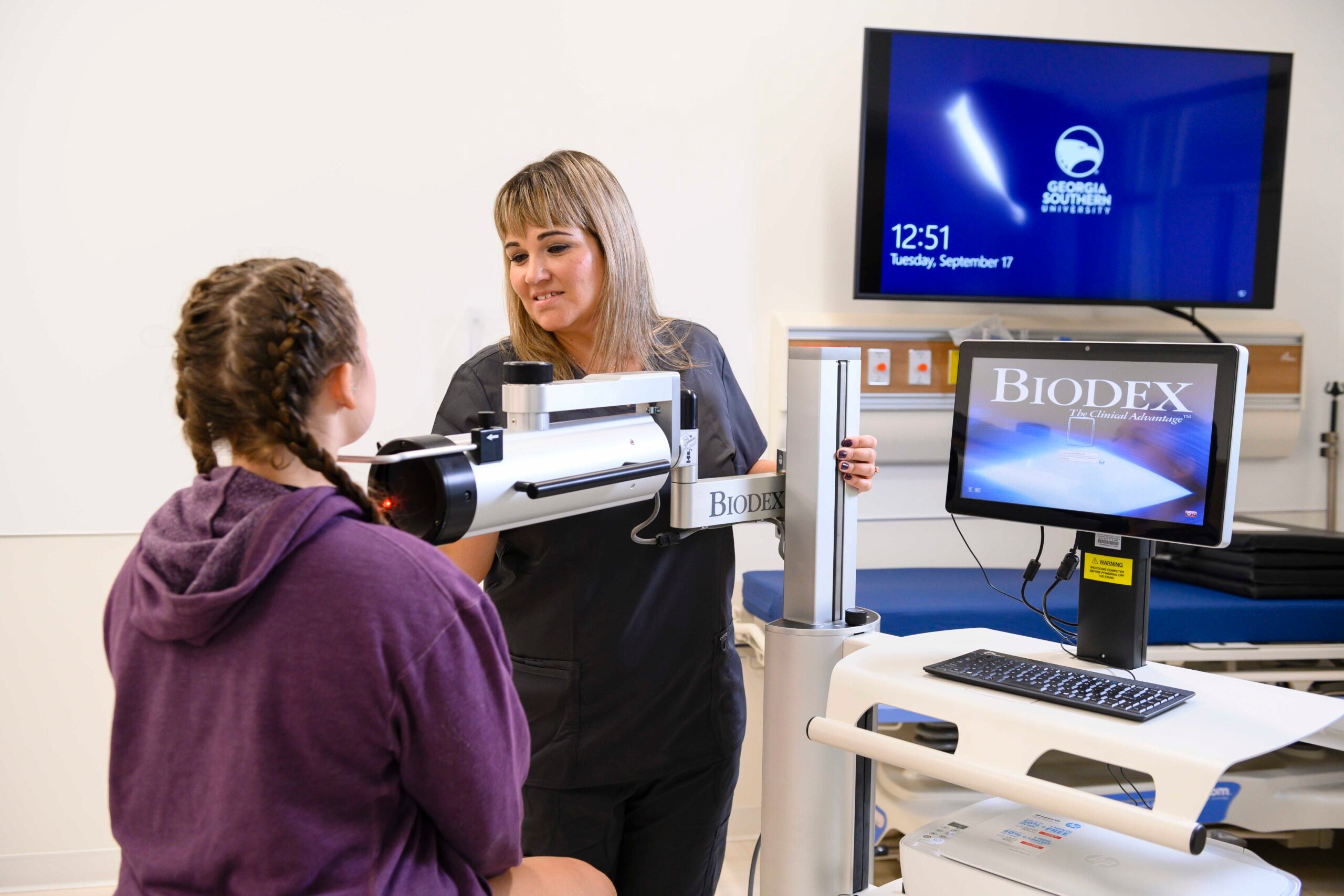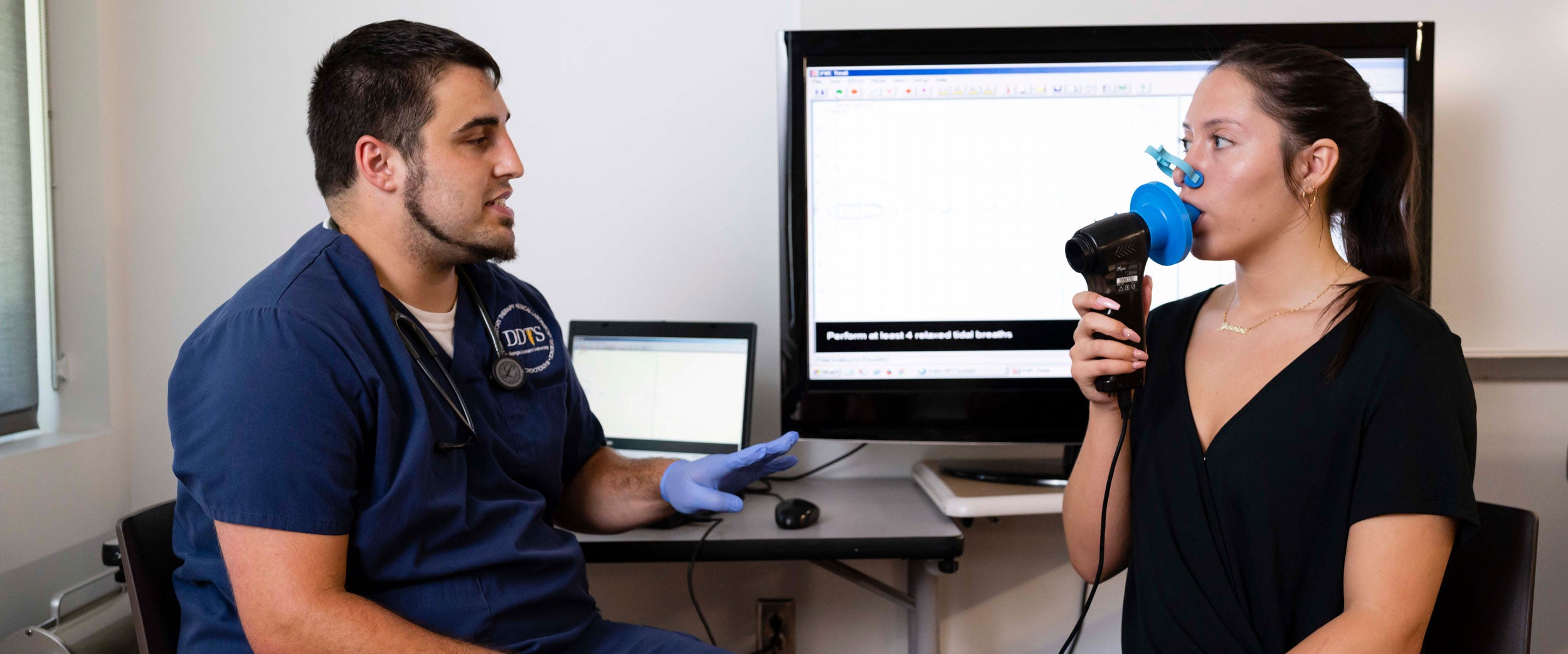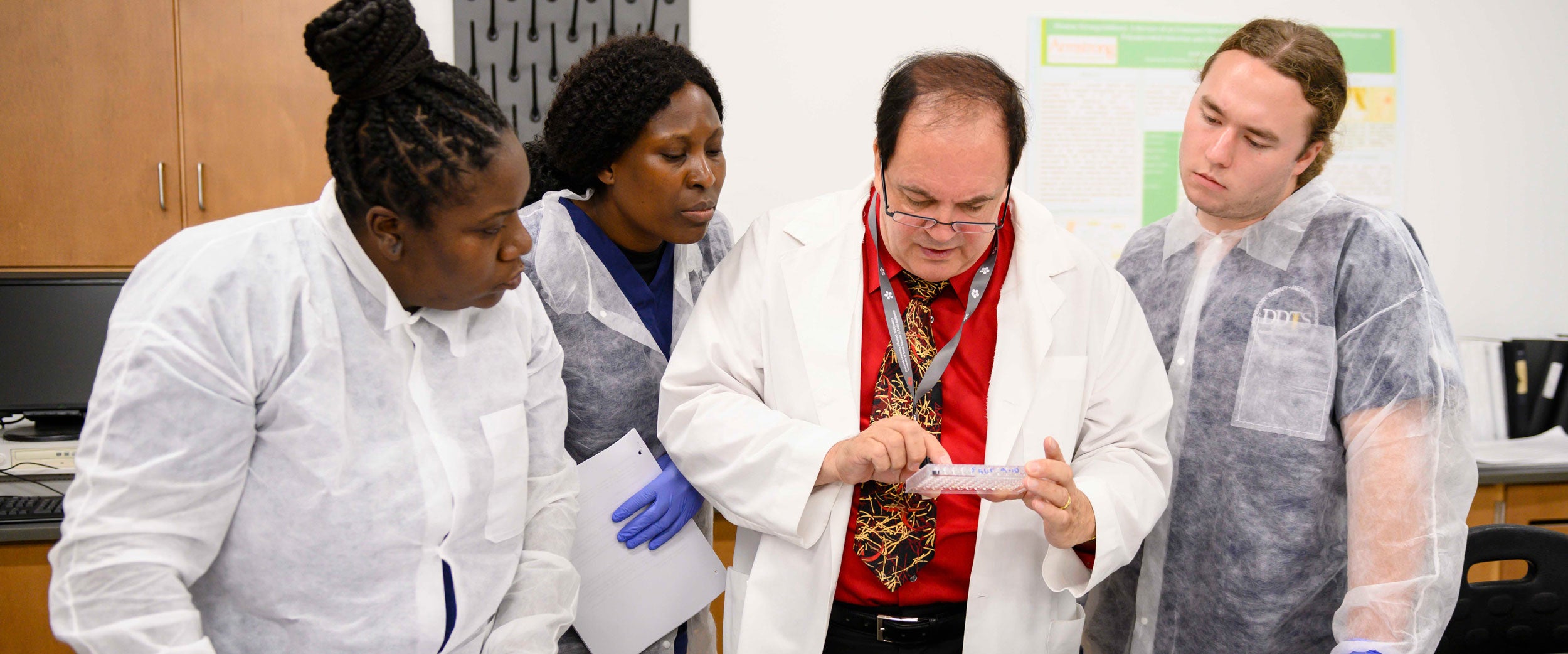Play a vital role in diagnosing and treating disease with a specialized career in nuclear medicine technology.
Locations
- Armstrong Campus (In Person)
Why Concentrate in Nuclear Medicine at Georgia Southern?
- One of ten undergraduate programs of its kind in the country.
- Gain clinical experience through rewarding clinical rotations.
- Develop specialized diagnostic skills needed in almost every medical field.
- 130 credit hours to completion.
Nuclear medicine technologists specialize in using radioactive pharmaceuticals to image the body and diagnose or treat disease. This unique type of imaging highlights organ structure and function, and is often used to gather key information. Nuclear medicine technology plays an important role in many medical specialties, from cardiology to pediatrics to oncology.
Georgia Southern’s nuclear medicine concentration is one of less than ten undergraduate programs of its kind in the country. You’ll learn the latest procedures and practices for the industry and gain clinical experience in general nuclear medicine, Computed Tomography (CT) and Positron Emission Tomography (PET).
Ready to Apply?
What Can You Do with a Bachelor’s in Nuclear Medicine Technology?
Nuclear medicine uses radioactivity to safely gather and analyze the information physicians need to diagnose and treat a wide range of diseases. It is safe, cost-effective and often requires less intervention than other methods.
Your work begins with injecting or administering radiopharmaceuticals to highlight specific organs or tissues. You’ll use specialized imaging equipment, like gamma cameras or PET scanners, to track how the radiopharmaceuticals move through the patient’s body, capturing images and analyzing the data they reveal. Finally, you’ll monitor patients and collaborate with physicians as they create a treatment plan.
Earning a bachelor’s degree with a nuclear medicine concentration equips you to specialize in a number of health care roles, such as nuclear medicine technologist, radiation safety officer, chief technologist and a CT or PET imaging specialist.
Where our graduates work:
- Mayo Clinic
- Kaiser Permanente
- St. Joseph’s
- GE Healthcare
- Atrium Health
- Emory Healthcare
- Children’s Healthcare of Atlanta
- AdventHealth
- Memorial Health
- Wellstar Health System
- Northside Hospital
What our graduates do:
- Nuclear medicine technologist
- Nuclear medicine PET-CT technologist
What You’ll Learn
After building a strong foundation in physics, chemistry, anatomy and physiology, nuclear medicine students will study the principles of nuclear medicine, including imaging, diagnoses, therapies, radiopharmaceuticals and radiation equipment. You’ll begin applying your skills in supervised clinical rotation, where you’ll develop real-world experience with patient care.
In addition to core curriculum classes, every radiologic sciences student completes courses on patient care, research methodologies, leadership and management, advanced radiologic sciences and medical communication skills.
See the CurriculumBuild Your Experience
The nuclear medicine technology program at Georgia Southern is designed to equip graduates with the quality education, valuable clinical experience and vibrant resources you need to launch a successful career.
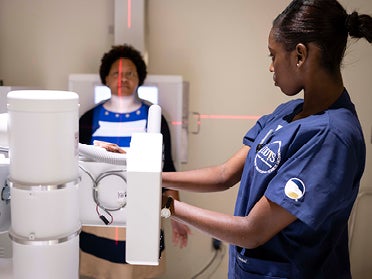
Real-World Experience
Learn how to use advanced imaging technology and care for actual patients as you participate in supervised clinical rotations where you’ll build confidence.
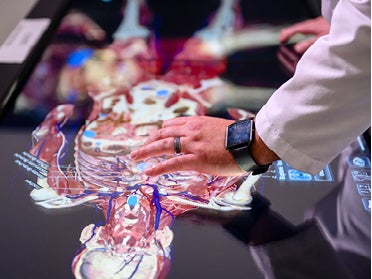
Facilities + Faculty
Work with nationally-recognized faculty scholars and practitioners during clinical experiences and while conducting research.
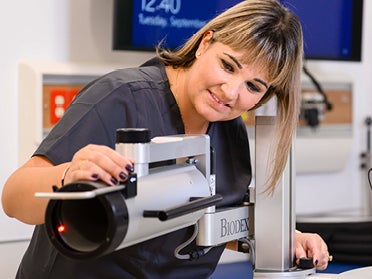
Hands-On Training
Build your expertise as you learn how to operate sophisticated imaging equipment and technology in our state-of-the-art Health Professions Academic Building.
Take Action
Applications for the radiologic sciences program with a concentration in cardiovascular interventional science are accepted from Nov. 15 through March 1.
Late applications will be considered on a case-by-case basis. Qualified applicants who met the March 1 deadline will be granted priority over applicants who did not meet the initial deadline. Certain programs may continue to review applications after the deadline until the program’s capacity is met.
Admission to Georgia Southern University does not guarantee admission to the concentrations in radiologic sciences. The Department of Clinical Sciences has a separate formal admissions process in addition to the admission process for the University. Applicants must submit a formal application to the program of interest and transcripts of all college and technical school coursework.
Follow these steps to complete the Georgia Southern application:
- Create an application account.
- Complete our online application using the PIN you received after creating your application account.
- Once complete, pay the $30 application fee or upload a valid fee waiver. Previous Georgia Southern applicants and dual enrollment students do not need to pay the fee.
- You can check your application status at My.GeorgiaSouthern.edu/admissions three days after completing your application. This page contains live information about your admission status, including a checklist of missing documents we need to make a decision.
Applicants to the radiologic sciences program must meet these minimum admission requirements:
- Acceptance into Georgia Southern University.
- Complete and pay the Allied Health Centralized Application Service (AHCAS) Application.
- Complete the entrance exam and submit the results by March 1. Applicants may contact the Georgia Southern University Testing Services at 912-344-2582 or visit MCC 206 for more information or to schedule the exam.
- Achieve a cumulative GPA of 2.5 or higher for all college work. Applicants with less than a 2.5 may be considered under special circumstances.
- Special Options (second certification) applicants must provide proof of ARDMS, ARRT or NMTCB certification.
- Students who are admitted to the program are strongly encouraged to complete the remaining core courses during the summer semester before the start of the program. Failure to meet all core requirements before beginning the program may delay your graduation.
- Prior to applying to the program, you must complete the following:
- 50 semester hours of core degree requirements, which include two college English composition courses and college algebra or higher.
- Required lab sciences (significant preference for admission will be given to those applicants that have completed all of the five required sciences):
- Nuclear Medicine – Must include Human Anatomy and Physiology I with lab, Survey of Chemistry with lab or Introduction to Chemistry with lab, Physics with lab or Physical Environment with lab, and one additional lab science in the program of study.
Applicants not meeting the criteria stated above may apply and will be considered under special circumstances at a later date.
A new class begins in August (fall semester) each year. Applications will be considered on a competitive basis, and written notification of acceptance will begin in late March (no one will be notified of acceptance by phone). Applications received after the submission deadline will be considered only if seats are available. The amount of completed coursework, the number of science courses completed, entrance exam scores and GPA determine competitiveness. Additional points may be awarded for completion of selected coursework in the major. Interviews may be required for qualified candidates. Please see your advisor for details.
Please note that prior conviction of a felony or misdemeanor may prevent you from sitting for the national certification examination. If you have been convicted of either a felony or misdemeanor, you must complete the pre-application review process as prescribed by the certification agency and provide the Department with verification of eligibility for the examination.
Georgia Southern University is an equal-opportunity education institution and does not discriminate based on sex, race, age, religion, sexual orientation, disability, or national origin in employment, admissions or activities.
Apply as a First-Year Student Transfer to Georgia SouthernThe nuclear medicine concentration at Georgia Southern University is accredited by the Joint Review Committee on Educational Programs in Nuclear Medicine Technology. This program is currently on probation but it is accredited.
For more information, go to the JRCNMT online directory of accredited programs and read the accreditation letter linked to the program’s directory listing. Implications of attending a program that is on probation are available here.
JRCNMT
820 W. Danforth Rd, #B1
Edmond, OK 73003
Phone: 405-285-0546; mail@jrcnmt.org
www.jrcnmt.org
Graduate achievement data is an indicator of program effectiveness, demonstrating the extent to which a program achieves its goals. The current report on graduate achievement data, identified by program, is available on the JRCNMT website: Graduate Achievement Report.
Graduate Achievement Data (January 1, 2022 – December 31, 2024):
- University: Georgia Southern University
- State: GA
- Highest Degree: BS
- Graduation Enrolled: 23
- Graduation Success: 96%
- Job Placement: 73%
- Number of Certification Exams: 22
- Certification Exam Success: 61%
*Data submitted by accredited programs and reviewed by JRCNMT. Refer to web page for definitions.
Goal 1: NM students/graduates will be clinically competent.
- All students will demonstrate satisfactory clinical performance.
- All NM students will apply clinically acquired skill sets.
Goal 2: NM students/graduates will possess critical thinking skills.
- All students will demonstrate the ability to perform nuclear medicine clinical/procedure calculations.
Goal 3: NM students/graduates will possess effective communication skills.
- All students will demonstrate effective oral communication skills.
- All students will demonstrate effective written communication skills.
Goal 4: NM students/graduates will demonstrate growth in professional development.
- All NM students will maintain membership in the professional societies.
- All NM students will maintain membership in the professional licensure.
Goal 5: NM students/graduates will be team oriented and compassionate.
- All NM students will perform community service hours.
- All NM students will reflect on the need to give back to the community in which they live and work.
Goal 6: The NM program will graduate students who are prepared for entry level NM positions.
- All NM students will sit for the national examinations as administered by the ARRT.
- All NM students will sit for the national examinations as administered by the NMTCB.
The Department of Clinical Sciences anticipates that graduates of this program will seek the following professional state licenses or national certifications: Registered Nuclear Medicine Technologist R.T.(N)., Certified Nuclear Medicine Technologists (CNMT) and state licensure.
The Department of Clinical Sciences has determined the required classes and educational activities of this academic program will qualify a graduate of this program to take the national ARRT examination to obtain Registered Nuclear Medicine Technologists RT(N) credentials. The department has not determined whether this program satisfies the requirements of all states and territories for Registered Nuclear Medicine Technologist RT(N) or state licensure. Visit the American Society of Radiologic Technologists to determine the requirements of your state or territory.
The Department of Clinical Sciences has determined the required classes and educational activities of this academic program will qualify a graduate of this program to take the Nuclear Medicine Technology Certification Board (NMTCB) exam to obtain Certified Nuclear Medicine Technologists credentials. The department has not determined whether this program satisfies the requirements of all states and territories for the Nuclear Medicine Technologist credential or state licensure. Visit the Society of Nuclear Medicine and Molecular Imaging (SNMMI) to determine the requirements of your state or territory.
Many of the clinical programs offered by the Waters College of Health Professions require a clinical internship or practicum experience to fulfill degree requirements. Pursuant to the University’s legal agreements, participants in clinical experiences are required to abide by the workplace rules of the clinical site. Sometimes these rules include vaccination requirements. As always, WCHP will continue to make every effort to place students at clinical sites. However, please be aware that we may be unable to locate a site to accept unvaccinated students, which may cause a delay or inability to progress and complete the program of study.
Related Programs
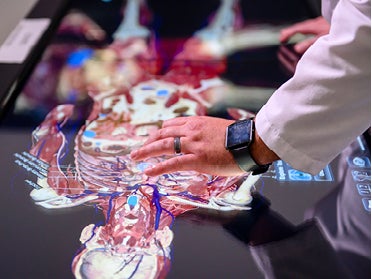
Take the Next Step
See a bright future for your career when you specialize in nuclear medicine. Discover the nuclear medicine technology program at Georgia Southern.
Contact Us
Radiologic Sciences
Phone: 912-344-2550
radsci@georgiasouthern.edu
Department of Clinical Sciences
Georgia Southern University Armstrong Campus
Department 4902
11935 Abercorn Street
Savannah, GA 31419

